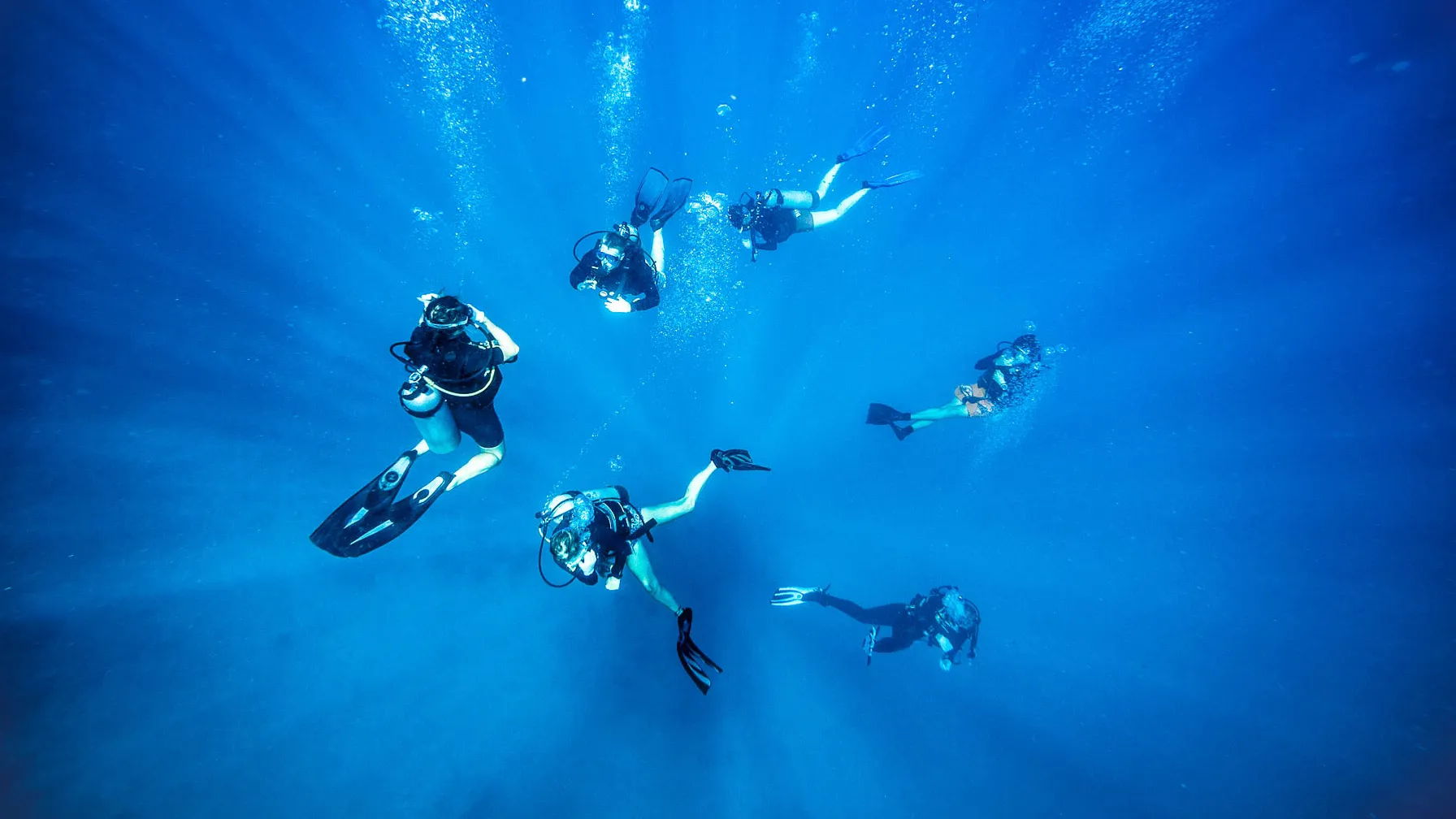
Scuba diving is an exhilarating and adventurous activity that allows individuals to explore the wonders of the underwater world. Whether you are an experienced diver or a beginner eager to take the plunge, there are always intriguing facts about scuba diving that are worth discovering. From the historical significance of diving to the diverse marine life encountered, scuba diving encompasses a wide range of fascinating elements. In this article, we will delve into 12 interesting facts about scuba diving that will deepen your understanding and appreciation for this captivating sport. So, let’s strap on our fins, adjust our masks, and embark on an underwater journey filled with awe-inspiring discoveries!
Key Takeaways:
- Scuba diving offers a thrilling opportunity to explore the underwater world and witness marine life up close, from colorful coral reefs to majestic sea creatures like dolphins and sharks.
- The sport of scuba diving has a rich history, dating back thousands of years, and continues to promote environmental awareness and conservation efforts to protect marine ecosystems.
Scuba diving is a popular recreational activity around the world.
People from all walks of life flock to tropical destinations to experience the thrill and beauty of underwater exploration.
The concept of scuba diving dates back thousands of years.
Ancient civilizations, such as the Greeks and Romans, used hollow reeds to breathe underwater, allowing for limited exploration beneath the surface.
The word “scuba” stands for Self-Contained Underwater Breathing Apparatus.
This device enables divers to carry their own air supply, consisting of compressed air or a specialized breathing gas mixture.
Scuba diving equipment has come a long way over the years.
Modern scuba gear includes a mask, fins, a buoyancy control device, a regulator, and a dive computer to monitor depth and time underwater.
Scuba diving provides a unique opportunity to witness marine life up close.
Divers can encounter colorful coral reefs, tropical fish, sea turtles, dolphins, and even sharks during their underwater adventures.
The world record for the deepest scuba dive is an astonishing 332.35 meters (1,090 feet).
Ahmed Gabr achieved this incredible feat off the coast of Egypt in 2014, breaking the previous record of 318 meters (1,044 feet).
Scuba diving offers a sense of weightlessness underwater.
The buoyancy control device allows divers to achieve neutral buoyancy, making them feel as if they are floating effortlessly in the water.
The Great Barrier Reef in Australia is one of the most popular scuba diving destinations in the world.
With its breathtaking coral formations and diverse marine life, it attracts divers from all corners of the globe.
Scuba diving can be a physically demanding activity.
Divers must undergo training and be in good health to ensure their safety and enjoyment underwater.
Scuba diving has therapeutic benefits.
The serenity and calmness of the underwater world can have a positive effect on mental well-being, reducing stress and anxiety.
The Professional Association of Diving Instructors (PADI) is the world’s largest scuba diving training organization.
They offer a range of courses, from beginner to professional levels, to educate and certify divers globally.
Scuba diving is an activity that promotes environmental awareness and conservation.
Divers are encouraged to practice responsible diving, respecting marine ecosystems and taking part in underwater clean-up initiatives.
These 12 facts about scuba diving highlight the excitement, wonder, and adventure that await those who dive beneath the surface of the sea. Whether you’re an experienced diver or considering trying it for the first time, the underwater world is full of beauty and mystery just waiting to be explored.
Conclusion
In conclusion, scuba diving is a thrilling and fascinating sport that allows individuals to explore the wonders of the underwater world. From exploring vibrant coral reefs to encountering majestic marine creatures, scuba diving offers an unforgettable adventure like no other. Whether you are a beginner or an experienced diver, there is always something new to discover beneath the surface.Remember, safety should always be the top priority when engaging in scuba diving activities. It is important to receive proper training, follow all diving protocols, and use the correct equipment. By doing so, you can ensure an enjoyable and safe diving experience.So, gear up, take a deep breath, and dive into the magnificent world beneath the waves. Explore the depths, witness the beauty, and create memories that will last a lifetime. Happy diving!
FAQs
Q: Do I need to have any prior experience to go scuba diving?
A: No, you don’t need any prior scuba diving experience to go diving. However, it is recommended to take a scuba diving certification course to learn the necessary skills and safety procedures.
Q: How long does it take to become a certified scuba diver?
A: The time required to become a certified scuba diver varies depending on the course you choose. Typically, it takes around 3-4 days for the basic Open Water Diver certification.
Q: Is scuba diving dangerous?
A: When proper safety measures are followed and the necessary training is received, scuba diving is a safe activity. However, it is essential to adhere to diving guidelines, use appropriate equipment, and dive within your certification limits.
Q: Can I go scuba diving if I don’t know how to swim?
A: It is highly recommended to know how to swim before attempting scuba diving. Although you don’t have to be an expert swimmer, basic swimming skills will help you feel more comfortable and confident in the water.
Q: Are there any age restrictions for scuba diving?
A: While there is no maximum age limit for scuba diving, some certification agencies may impose minimum age requirements. Most agencies offer junior courses for children as young as 10 years old.
Q: Can I wear glasses or contact lenses while diving?
A: If you wear glasses, you can choose to dive with prescription masks. For contact lens wearers, it is generally safe to dive with them, but consult with your doctor or dive instructor to ensure it is suitable for your specific situation.
Q: How deep can I dive as a certified scuba diver?
A: The depth you can dive depends on the certification level you have achieved. Open Water Divers can typically dive up to 18 meters (60 feet), while more advanced certifications allow for deeper dives.
Q: Are there any health restrictions for scuba diving?
A: Yes, certain medical conditions can prevent individuals from scuba diving. It is important to complete a medical questionnaire and consult with a doctor before starting your scuba diving journey.
Q: What equipment do I need for scuba diving?
A: The essential scuba diving equipment includes a mask, fins, a buoyancy control device (BCD), a regulator, a dive computer, and a wetsuit or dry suit depending on the water temperature.
Q: Where are the best scuba diving locations?
A: The world is full of incredible scuba diving destinations. Some popular ones include the Great Barrier Reef in Australia, the Red Sea in Egypt, the Maldives, the Galapagos Islands, and the cenotes in Mexico.
Q: Can I take underwater photos while scuba diving?
A: Yes, many scuba divers enjoy capturing the beauty of the underwater world through underwater photography. However, it is important to prioritize safety and not disturb the marine life while taking photos.
Q: How much does scuba diving equipment cost?
A: The cost of scuba diving equipment can vary depending on the brand and quality. A basic set of equipment, including a mask, fins, and a snorkel, can range from $200 to $500, while a complete set including all necessary gear can cost around $1000 to $3000.
Scuba diving offers a thrilling adventure, but there's still more to explore! If you're hungry for additional underwater wisdom, check out our other articles. From mind-blowing scuba facts that will leave you amazed to enigmatic details about this captivating sport, we've got plenty of knowledge to share. And if 12 facts aren't enough, we've got even more scuba diving trivia waiting for you. So, gear up and get ready to plunge into a sea of information!
Was this page helpful?
Our commitment to delivering trustworthy and engaging content is at the heart of what we do. Each fact on our site is contributed by real users like you, bringing a wealth of diverse insights and information. To ensure the highest standards of accuracy and reliability, our dedicated editors meticulously review each submission. This process guarantees that the facts we share are not only fascinating but also credible. Trust in our commitment to quality and authenticity as you explore and learn with us.


